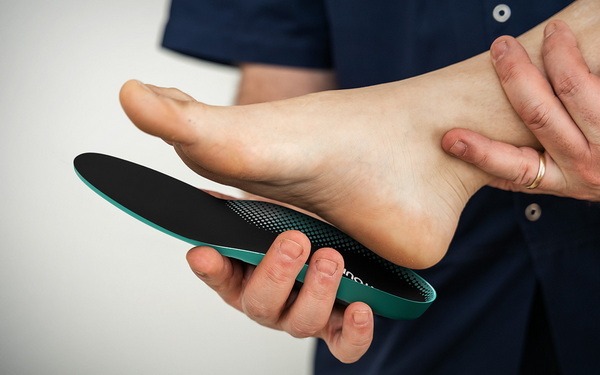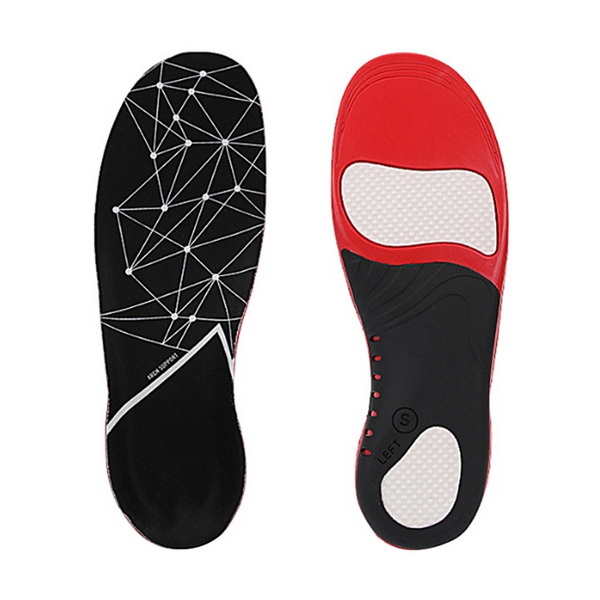Views: 222 Author: Amanda Publish Time: 2025-09-05 Origin: Site











Content Menu
>> Symptoms of Flat Feet Include:
● What Are Arch Support Insoles?
● How Do Arch Support Insoles Help Flat Feet?
>> Pain Relief
>> Enhanced Stability and Balance
>> Prevention of Further Damage
>> Support Through Different Stages of Life
● Choosing the Right Arch Insole for Flat Feet
>> Types of Flat Feet Require Different Supports
>> When to Consider Custom Arch Insoles
>> Tips for Selecting Arch Insoles
● Benefits of Arch Support Insoles for Flat Feet
>> Improved Posture and Movement
>> Enhanced Stability and Injury Prevention
>> Increased Endurance and Performance
>> Versatility Across Footwear
● Caring for Your Arch Insoles
● Lifestyle and Exercise Tips to Support Flat Feet
● FAQ
>> 1. Are arch support insoles necessary for everyone with flat feet?
>> 2. Can arch support insoles fix flat feet permanently?
>> 3. How do I know if my arch insoles are fitting correctly?
>> 4. Can children with flat feet use arch support insoles?
>> 5. Are there activities where arch insoles are especially helpful?
Flat feet, medically known as pes planus, affect millions of people worldwide and can cause discomfort, pain, and mobility challenges. One popular solution to manage these symptoms is the use of arch support insoles. This article explores whether arch support insoles are good for flat feet, how they work, their benefits, and guidance on choosing the right arch insoles. With detailed explanations, visuals, and videos, this comprehensive guide will help understand the role of arch insoles in improving foot health and overall well-being.

Flat feet occur when the arches in the feet collapse, causing the entire sole to touch the ground when standing. This condition can be congenital or develop later due to injury, aging, or overuse. Flat feet can lead to a range of symptoms such as foot pain, swelling, tiredness, and instability. Beyond the feet, flat feet can affect the knees, hips, and lower back due to misalignment.
- Pain and discomfort at the arch or heel
- Overpronation (foot rolling inward)
- Foot fatigue and swelling after standing or walking
- Difficulty with certain activities or footwear comfort
Flat feet can vary in severity, with some people experiencing no symptoms, while others suffer significant pain and mobility issues. Understanding how arch support insoles can help this condition is key to finding effective relief.
Arch support insoles are specially designed shoe inserts that fit inside shoes to provide additional support to the foot's arch. For people with flat feet, these insoles help:
- Redistribute pressure evenly across the foot
- Support the collapsed arches
- Improve alignment of the foot and lower limbs
- Provide cushioning and shock absorption
Arch insoles help the foot maintain a more natural arch shape during movement and reduce excessive strain on muscles and ligaments. They come in various materials and designs, including foam, gel, and custom orthotics.
Arch insoles lift the midfoot to maintain its natural curve, preventing the foot from collapsing inward (overpronation). This correction aligns the ankle, knee, and hip joints properly, reducing strain on the entire lower body. Proper alignment benefits not just the feet but the entire musculoskeletal system.
By cushioning the foot and redistributing pressure away from painful areas, arch insoles alleviate discomfort associated with flat feet conditions such as plantar fasciitis, Achilles tendonitis, and heel pain. This relief can significantly enhance quality of life, allowing better participation in daily activities.
Arch support insoles stabilize the foot, preventing excessive rolling and providing balance on uneven surfaces. This lowers risks of ankle sprains and muscle fatigue, making walking and standing more comfortable and safe.
Regular use of properly fitted arch insoles can reduce the likelihood of developing complications like shin splints or knee pain linked to flat feet. They also help prevent the progression of deformities in the feet and posture-related problems.
As people age, the arches of the feet tend to weaken. Arch insoles provide vital support for older adults to maintain mobility and reduce fall risks. They are also beneficial for athletes and those who spend long hours on their feet.

Selecting the right arch insole depends on the flat feet type, foot size, and activity level:
- Rigid Flat Feet: Arch appears flattened in both standing and sitting. Low arch insoles with firm support are preferable to accommodate less flexible feet.
- Flexible Flat Feet: Arch is visible when sitting but flattens when standing. Medium arch insoles that balance cushion and support work well, allowing some natural foot movement.
- Firm but comfortable arch support (not overly soft), to provide sufficient lift without causing discomfort
- Deep heel cup for stability, which helps keep the foot aligned and absorbs shock
- Durable cushioning materials that absorb impact over time, important for daily use or athletic activities
- Customizable or self-molding insoles for tailored fit, especially useful for irregular foot shapes
- Breathable and moisture-wicking top layers, to keep feet dry and reduce odor or fungal infections
For severe flat feet or persistent pain, custom-made arch insoles provide precise support tailored to individual foot shape and biomechanics, improving long-term comfort and function. They are typically prescribed by podiatrists following a comprehensive foot evaluation.
- Consult a foot specialist to assess your specific needs
- Consider insoles designed for your lifestyle—whether for athletic performance, everyday use, or specific occupational requirements
- Try various brands and types to find the best fit and support level
- Monitor how your feet respond to the insoles and adjust as needed
Arch support insoles offer a range of benefits that can transform the experience of living with flat feet by addressing common issues at the root cause.
One of the primary benefits is relief from foot and leg pain. By supporting the arch, insoles reduce strain on the plantar fascia and surrounding muscles, easing symptoms of plantar fasciitis, heel spurs, and tendonitis.
Feet are the foundation of body alignment. When the arches are supported, the body maintains better posture, reducing stress on the knees, hips, and lower back. This alignment helps prevent secondary musculoskeletal issues.
Arch insoles improve foot stability by controlling overpronation, which is common in flat feet. This control lowers the risk of injury during physical activities by promoting safer foot mechanics.
Supportive insoles help absorb shock and reduce fatigue in the feet, allowing for longer periods of activity without discomfort. This can be particularly beneficial for athletes or individuals with active lifestyles.
Arch insoles are available for various types of footwear, from casual shoes to hiking boots and athletic sneakers. This versatility ensures people with flat feet can find support regardless of their chosen activity or style.

The longevity and effectiveness of arch insoles depend on proper care and maintenance.
- Clean regularly with mild soap and water; avoid harsh chemicals that can degrade materials
- Air dry completely before placing back in shoes to prevent odor and bacterial growth
- Replace insoles every 6 to 12 months depending on wear and frequency of use, as support and cushioning degrade over time
- Rotate between multiple pairs if possible, especially for those who wear insoles daily or engage in varied physical activities
- Periodically reassess your foot condition and how the insoles feel, adapting or upgrading as needed
In addition to wearing arch support insoles, incorporating certain lifestyle habits and exercises can promote foot strength and health.
- Foot Strengthening Exercises: Toe curls, heel raises, and arch lifts can strengthen muscles that support the foot's arch.
- Stretching: Regular calf and Achilles tendon stretches relieve tension that can worsen flat feet symptoms.
- Weight Management: Maintaining a healthy weight reduces pressure on the feet, easing discomfort.
- Proper Footwear: Wearing shoes with good cushioning and arch support complements the use of insoles.
- Rest and Ice: For flare-ups, resting the feet and applying ice can reduce inflammation and pain.
Arch support insoles can be highly beneficial for managing flat feet by providing essential support, reducing pain, improving alignment, and enhancing stability. Whether for daily wear or athletic activities, choosing insoles tailored to one's foot type and needs can lead to noticeable improvements in comfort and mobility. While prefabricated arch insoles offer relief to many, custom insoles remain the gold standard for addressing complex flat feet problems. Consistent use under the guidance of a foot care professional ensures optimal results and can help prevent secondary complications related to flat feet.

Not every person with flat feet requires arch support insoles. However, those experiencing pain, instability, or related symptoms usually benefit significantly from wearing them.
Arch support insoles do not cure flat feet but effectively manage symptoms and prevent complications by supporting the foot structure.
Proper fit means the insoles feel comfortable without causing pressure points or pain and provide noticeable support to the arch during walking.
Yes, children can use arch insoles, especially during growth phases, to prevent pain and promote good foot development under professional advice.
Arch insoles are valuable during standing-intensive jobs, running, hiking, or sports where foot support and shock absorption are crucial.
[1](https://medi-dyne.com/blogs/posts/how-does-arch-support-help-flat-feet)
[2](https://redi-thotics.com/arch-support-insoles-for-flat-feet/)
[3](https://www.thepodiatrygroup.com/2023/04/21/flat-feet-and-arch-supports-explained/)
[4](https://www.straitspodiatry.com/custom-flat-foot-insoles/)
[5](https://xtremity.ae/blog/benefits-of-insoles-for-flat-feet/)
[6](https://www.nuffieldpodiatry.com.sg/blog/understanding-flat-feet-and-the-role-of-arch-support-in-treatment)
[7](https://lightfeet.com/blogs/foot-conditions/best-arch-support-insoles-for-flat-feet)
[8](https://www.uticafootdoc.com/blog/item/685-arch-support-benefits-for-flat-feet)
[9](https://www.mayoclinic.org/diseases-conditions/flatfeet/diagnosis-treatment/drc-20372609)
[10](https://treadlabs.com/blogs/insoles-reach-your-stride/insoles-for-flat-feet-support-the-arch-relieve-the-pain)
[11](https://pmc.ncbi.nlm.nih.gov/articles/PMC7446821/)
[12](https://www.youtube.com/watch?v=BUUZD1XRpo0)
[13](https://www.reddit.com/r/flatfeet/comments/1hq1rp1/should_i_get_low_or_moderate_arch_insole_support/)
[14](https://betterhood.in/learn/benefits-of-arch-support-insoles-for-flat-feet/)
[15](https://www.sciencedirect.com/science/article/pii/S2773157X23001224)
[16](https://www.upstep.com/a/answers/pain-management/why-do-arch-supports-hurt-my-flat-feet-and-how-to-relieve-the-pain)
[17](https://insoles.com/pages/symptoms-and-conditions-flat-low-arches)
[18](https://www.forbes.com/sites/forbes-personal-shopper/article/best-insoles-for-flat-feet/)
[19](https://myankle.co.uk/blog/if-i-have-flat-feet-should-i-wear-insoles)